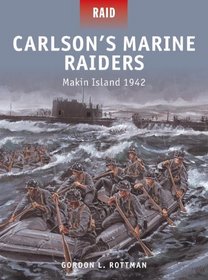Search -
Carlson's Marine Raiders - Makin Island 1942
Carlson's Marine Raiders Makin Island 1942
Author:
After the Guadalcanal landings, Admiral Nimitz wanted to distract Japanese attention by launching an amphibious raid elswhere. Foreshadowing Bloody Tarawa, Iwo Jima, Okinawa and countless other landings in the face of intense Japanese resistance, the Makin Raid taught the Marines a great deal. — Featuring specially commissioned full-color artwork... more »
Author:
After the Guadalcanal landings, Admiral Nimitz wanted to distract Japanese attention by launching an amphibious raid elswhere. Foreshadowing Bloody Tarawa, Iwo Jima, Okinawa and countless other landings in the face of intense Japanese resistance, the Makin Raid taught the Marines a great deal. — Featuring specially commissioned full-color artwork... more »
The Market's bargain prices are even better for Paperbackswap club members!
Retail Price: Buy New (Paperback): $14.29 (save 24%) or
Become a PBS member and pay $10.39+1 PBS book credit
![header=[] body=[Get a free book credit right now by joining the club and listing 5 books you have and are willing to share with other members!] Help icon](/images/question.gif?v=90afaeb39) (save 45%)
(save 45%)ISBN-13: 9781472803276
ISBN-10: 1472803272
Publication Date: 6/17/2014
Pages: 80
Rating: ?
ISBN-10: 1472803272
Publication Date: 6/17/2014
Pages: 80
Rating: ?
0 stars, based on 0 rating
Genres:
- History >> Military >> Intelligence & Espionage
- History >> Military >> United States
- History >> Military >> World War II




